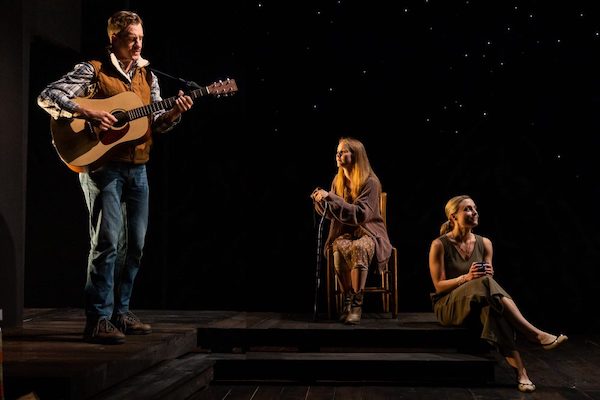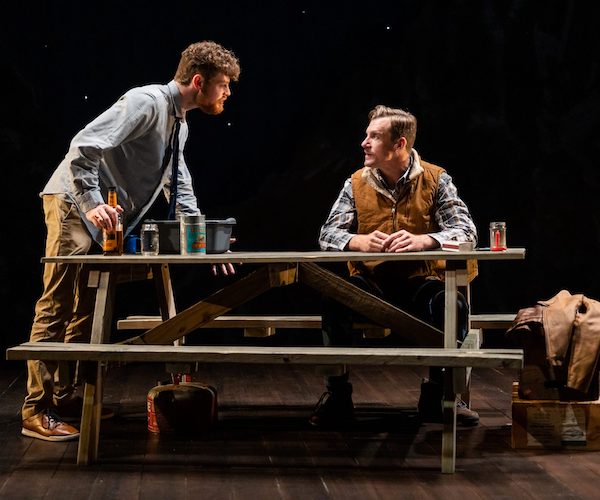Theater Review: “Heroes of the Fourth Turning” — Dear Lord, Pray for Them
By Bill Marx
It shouldn’t be surprising that Heroes of the Fourth Turning is monotonously ironic. No happy warriors for Christ here.
Heroes of the Fourth Turning by Will Arbery. Directed by Marianna Bassham. Staged by SpeakEasy Stage Company at the Stanford Calderwood Pavilion at the Boston Center for the Arts, 527 Tremont Street, in Boston’s South End, through October 8.

Jesse Hinson, Elise Piliponis, and Dayna Cousins in Heroes of the Fourth Turning. Photo: Nile Scott Studios
Back in the day, when I was in college, students in various states of inebriation would often gather at night after classes and hold debates, sometimes lasting for hours, that were referred to as “bull sessions.” They were wide ranging — sometimes inane, sometimes incisive — conversations that could become quite heated as we tried to outdo each other to deliver “definitive” answers to philosophical quandaries large and small — the existence of God, the nature of the Good, the best way to pour a beer, etc. I thought of those halcyon days as I sat through Will Arbery’s exhausting Heroes of the Fourth Turning. Unfortunately, the dramatist was not satisfied with staging an (at times) provocative conversation: along the way he heaps in over-generous helpings of psychodrama, soap opera, religious and political satire, and even bits of supernatural ugga bugga. The resulting two-hour-and-ten-minute-long talkathon is delivered without an intermission. That is a long haul to perdition. Or would that be purgatory?
I say purgatory because the participants are graduates of Transfiguration College of Wyoming, a conservative Christian institution that is anti-abortion, anti-LGBT, and contemptuous of federal funding because of the sinful strings attached: secular, hedonist, liberal, and socialist. Seven years after graduation some former students have gathered to celebrate the ascension of one of their beloved teachers to the presidency of the institution. The shindig takes place a week after the Charlottesville riot and two days before a solar eclipse. The portent level is high, and Arbery strains to match it, cramming in as much as he can — from the carnal to the cosmic — to deliver a compelling statement about Catholic white privilege. For many critics, the script approaches the Christian Right with illuminating sympathy. These believers are not uniform; they argue about the path forward in a fallen society. Some adore Trump, one vomited after he voted for him. They are as befuddled and vulnerable as the rest of us.
I don’t buy it. Granted, plays don’t usually name-drop Plato, the John Birch Society, Martin Heidegger, Steve Bannon, Gerard Manley Hopkins, Pat Buchanan, and Hannah Arendt (the latter’s critique of empathy is referenced). But, as in many a “bull session,” the ideas are oiled for easy consumption and the participants punch carefully selected hot button issues. The omissions in the debate are as telling as what’s included: abortion, tribalism, and the coming end of Western Civilization, yes; anti-Semitism, sexual abuse, and the climate breakdown, no. The latter topic would have been particularly interesting given the Pope’s inspiring 2016 encyclical, Laudato Si: “A true ecological approach always becomes a social approach; it must integrate questions of justice in debates on the environment, so as to hear both the cry of the earth and the cry of the poor.” (Note: There is mounting evidence that US Catholic bishops responsible for leading the Church have been silent and denialist about climate change.)

Nathan Malin and Jesse Hinson in Heroes of the Fourth Turning. Photo: Nile Scott Studios
The problem is that Heroes of the Fourth Turning presents us with a bedeviled quartet of young people whose “mental fight” is more about compensating for their deep insecurities (escaping feelings of helplessness) than confronting pressing realities. (Silent on class and capitalism, this “antimaterialist” crew is as oblivious to economics as the rest of American theater.) And that makes the script monotonously ironic. Happy warriors for Christ have left the building. Faith, hope, and charity (for each other, let alone for the underclass) is scarce. But there’s loads of hypocrisy, despair, loneliness, and betrayal. And secret misbehavior waiting to be revealed. Arbery gives his Christians few opportunities to step outside of their cubicles of alienation: solutions to what is characterized as America’s spiritual crisis range from raging war on the heathens to going into monkish seclusion or cherishing the inaction of gridlock. These characters cling desperately to the crosses they bear — no one challenges the others (and us) to listen “to the cry of the earth and the cry of the poor.” Instead, Arbery totes in unconvincing flickers of voices from the Beyond.
The SpeakEasy Stage Company production is capably directed by Marianna Bassham, though she can’t do much with the “this happens … and then this happens” movement of the tiring confab. The main instigator of the talk is Kevin (Nathan Malin), a wise-fool drunk who is worthy of hanging out in Harry Hope’s saloon. Like most of O’Neill’s alcoholics, he drifts in and out of a self-pitying stupor, his gab zigzagging from the comically silly to the unnervingly truthful. A liquor bottle glued to his hand, Malin handles the erratic highs and lows with the determination of a fledgling bronco rider. The others react to Kevin’s whirlwind of doubts and proclamations (such as wondering about Catholicism’s fear of sex) with varying degrees of sympathy or condescension. Emily is the most balanced (and humane) member of the group (she’s worked at a “pro-life women’s advocacy organization”) but, because of an enigmatic illness, she is the most immediately needy. She yearns for Justin’s quiet strength and longs to escape her problematic parents. (Her mother, Gina, is the new president of the college.) Jesse Hinton disappears into Justin’s silent reserve, while Elise Piliponis is effectively saintly until yanked into Exorcist territory.
As the Bannon-ite Teresa, Dayna Cousins delivers dogmatic bluster with the fervor of a Fox News commentator, denouncing the “soy boys” who won’t be of much use in the “fourth turning,” a violent spin of the wheel in a cockamamie schema that charts generational change. But Cousins falters at conveying the character’s (somewhat) drummed-up revelation of weakness. Karen MacDonald provides some welcome humor as the impatient Gina, who undercuts the political/personal hysteria with some moderating — if conventionally two-faced — conservative attitude. Still, her portrait could use more shocked steeliness: if these are typical graduates of Transfiguration College, then the school is churning out sad souls far flung from the Way of Christ.
Bill Marx is the editor-in-chief of the Arts Fuse. For four decades, he has written about arts and culture for print, broadcast, and online. He has regularly reviewed theater for National Public Radio Station WBUR and the Boston Globe. He created and edited WBUR Online Arts, a cultural webzine that in 2004 won an Online Journalism Award for Specialty Journalism. In 2007 he created the Arts Fuse, an online magazine dedicated to covering arts and culture in Boston and throughout New England.
Tagged: Heroes of the Fourth Turning, Marianna Bassham, SpeakEasy Stage Company

Thanks, Bill. Another play that (based on your review, in lieu of seeing it) makes me think the trend against intermissions stems from fear of the audience going out for a smoke and never coming back. In addition to giving the predominantly senior audience a much-needed bathroom break, intermission forces a play to have at least one high point before the climax. Two hours and 10 minutes is a LONG time to sit without a stretch break!